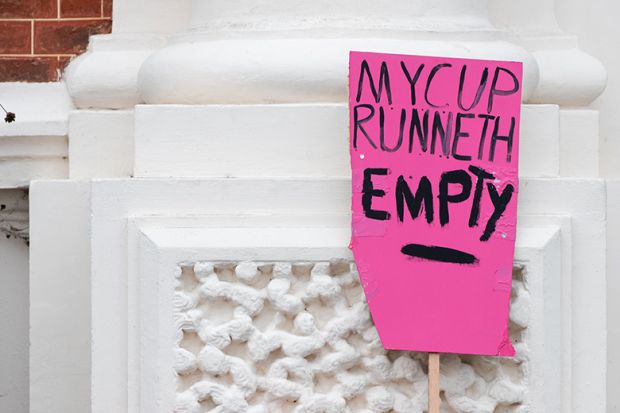The cancellation of seven days of strikes at UK universities has been branded “undemocratic” by some members of the University and College Union (UCU), who say employers’ offer of more talks was not sufficient to justify the decision.
Academics were left scrambling to hastily plan lectures following the union leadership’s announcement late on 17 February that walkouts planned for the period 21 February to 2 March would not go ahead.
A period of calm was needed to allow for intensive talks after “significant progress” on key issues including pay, pensions and zero-hours contracts, Jo Grady, the general secretary, said.
But many members said they felt blindsided by the temporary truce, with some organising a protest on 20 February outside UCU’s headquarters in Camden, to call for the leadership to stop acting “unilaterally” without engagement.
One of those attending, Jamie Woodcock, senior lecturer in management and marketing at the University of Essex Business School, said it had come as a “huge shock” to see the strikes called off so late in the day.
He said he could see “no movement in the dispute” with no new pay offer, no progress on workload or equality and “nothing concrete” on pensions. An agreement by employers to look into zero-hours contracts did not address the much wider issue of casualisation, he added.
“I would say this falls far, far short of what members voted to take action over,” Dr Woodcock said.
Saira Weiner, a senior lecturer at Liverpool John Moores University who sits on the union’s higher education committee – the body that usually makes decisions about calling industrial action – agreed.
“Our strike action has clearly put pressure on the employers,” she said. “But there is no evidence that there is enough movement to justify in any way the general secretary’s decision to impose a ‘pause’ on our strike action. UCU is a member-led union and many are extremely disappointed that this decision was made without reference to the UCU’s democratic structures or membership.”
She called for employers to be notified of more strikes to keep them under pressure or promises may not become reality.
Such jitters were shown when some accused the Russell Group of research-intensive universities of trying to renege on promises made by Universities UK in its joint statement released with UCU on the Universities Superannuation Scheme (USS) dispute.
UUK – the body that represents USS employers – had promised, if the improved financial outlook for the scheme is confirmed at next month’s valuation, to seek to return benefits to a level comparable with what they were before the April 2022 changes, and to prioritise this over reducing contributions.
In its statement the Russell Group said it was “committed to working with the USS employers’ group to improve benefits…and lower costs”, with no mention of prioritisation or any endorsement of the view that benefits could go as high as before. A spokesman said, however, that the group was in “full support” of UUK’s approach.
Vicky Blake, a past president of UCU and widening participation officer at the University of Leeds, urged employers to “act in good faith to end this dispute”.
She said members were continuing action short of a strike – including working to contract – and “employers must recognise it is unfair and dangerous to expect members to attempt the impossible by trying to prepare for everything coming this week in a single day”.
“There is preparatory time which has been missed due to the strike action, and there are simply not enough hours today to ‘make up’ for that time and remain healthy,” she said.
A UCU spokesman said: “The action taken so far has moved employers and secured important commitments on pay, conditions and pensions. In intensive negotiations, UCU will be pushing employers further on all issues in the disputes.
“Five days of strike action scheduled for March could still go ahead and this week our union will also begin reballoting to extend the mandate and allow action to take place for the rest of the academic year if employers fail to deliver.”

